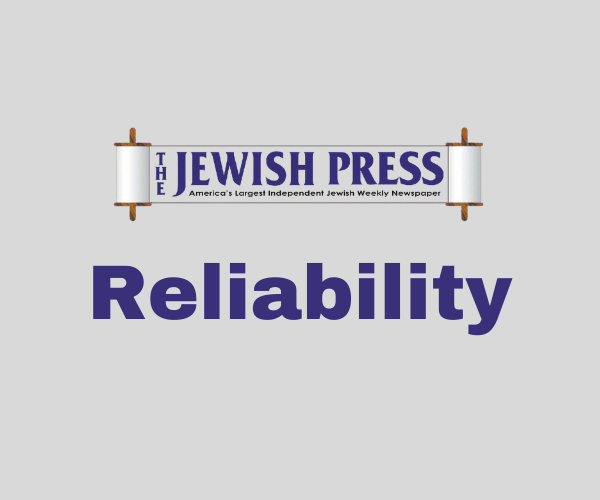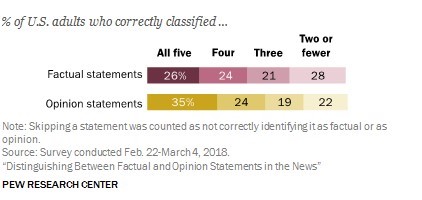
The Jewish Press is a digital and print newspaper with a focus on politics and religion through a Modern Orthodox perspective, founded in 1960 by Sholom Klass and Raphael Schrieber. It has received a Biasly computer bias score of Moderately Conservative and has been known for its conservative stances on political matters. In this article, we will investigate if The Jewish Press’ bias has affected its reporting reliability.
Does Reliability Matter?
Reliability, in general, refers to how trustworthy or accurate information, or in this case, a news source is. If we consider this definition, it quickly becomes clear why reliability is important in media sources. If we can’t trust the things we read then there isn’t much of a point in continuing to consume content from that source, after all. So how exactly can we gauge the reliability of a news source anyways?
There are several potential measures of reliability to look out for when trying to determine whether a media source is reliable or not. Red flags for an unreliable article can include the presence of wild unsubstantiated claims, facts dependent on other unreliable sources, heavy use of opinionated language, and more. Some indicators of a reliable news source, on the other hand, include things like:
- Absence of subjective/opinionated language in articles
- Credible sources cited (e.g., neutral sources, .gov, .edu websites)
- Facts and statistics backed by multiple relevant outside sources
- Use of primary sources when possible (e.g., interviews, quotes)
- Information that remains consistent across news sources
How Reliable is The Jewish Press?
The political reliability index developed by Biasly objectively assesses news organizations’ accuracy and trustworthiness. The Jewish Press’s overall Reliability Score has been rated as ‘Fair’ by Biasly. This rating is a weighted average of two distinct scores: the Fact Analysis Score and the Source Analysis Score, each evaluating separate components of The Jewish Press’s Reliability. When computing the Average Reliability of the article the Fact Analysis score is more heavily weighted. These ratings are as follows in the next two paragraphs:
The Jewish Press’s Fact Analysis Score is ‘Fair,’ which suggests readers can trust some of The Jewish Press’s content online. The Fact Analysis score focuses more on the accuracy of claims, facts, and sources presented in the article and any hints of selection and omission bias, which we will discuss further in the article.
The Jewish Press’s Source Analysis Score is ‘Fair,’ which suggests readers can trust some of the sources, links, and quotes provided by the news source. This score, which is based on A.I., focuses on assessing the quality of sources and quotes used including their number, lengths, uniqueness, and diversity.
However, since these scores are based on percentages and averages, individual articles could be more or less trustworthy depending on the context, author, and other factors. Our findings show that The Jewish Press’s reliability is mostly but not all factual because they have retracted several stories in the past or had pieces that were not factual.
Let us analyze the supporting data for The Jewish Press’s rankings and discuss what to watch out for while searching for trustworthy news sources.
The Jewish Press Accuracy and Reliability
Selection and omission bias are two factors whose presence weakens the reliability of an article. We will examine their presence to determine how accurate articles from The Jewish Press are.
Selection bias is when stories and facts are selected or deselected, often on ideological grounds, to create a narrative in support of the new sources’ ideology. Omission bias, on the other hand, is when different opinions and political views regarding a situation are left out so that the reader is only exposed to the ideological perspective supported by the author. It’s important to keep in mind these two types of biases when trying to assess an article’s level of accuracy.
Biasly checks for the number of sources per article, the frequency of evidence provided, and a number of other factors to determine the accuracy of an article. Much like Biasly’s Bias Meter, it gives a reliability percentage, with 1% being the least reliable and 100% being the most reliable.
As previously stated, The Jewish Press has a reliability score of 65%. This score can vary from article to article, though, and the most extreme variations in dependability are caused by bias, notably omission, and selection bias.
In addition, articles that display greater political bias tend to be less reliable. For example, ABC News has a somewhat liberal bias and has “Good” reliability. One of its articles, entitled “House passes anti-Asian hate crimes bill, legislation awaits Biden’s signature,” was determined to have a similar liberal bias and a reliability rating of “Excellent,” while “Biden calls new GOP-passed Georgia law restricting voting access an ‘atrocity,’” which has a Very liberal bias, has a reliability rating of only “Fair.”
A similar trend can be found within The Jewish Press.
“Former Vice President Mike Pence Joins GOP Presidential Race,” was given a bias rating of Center, while maintaining fair reliability, providing numerous dates and facts on Republicans who are planning to run for president. The article covered Pence’s past political involvement, the current candidates, their political experience, when they announced they would run, and important dates regarding selection of candidates and other related matters. The lack of an attempt to persuade the reader to a certain viewpoint resulted in a lack of omission or selection bias in the article and, as a result, a fair reliability.
“Netanyahu Demands Guterres Change UN’s Negative Attitude Toward Israel,” on the other hand, received a bias rating of Very Conservative, and a reliability rating of poor, with no citations, quotes, and a poor coverage of the situation, only listing Netanyahu’s requests and omitting Guterres responses and how Guterres wanted to deal with the situation.
Analysis of Reliability in The Jewish Press Opinion Pieces
While typically, stating one’s own opinion is looked down upon in informative journalism, opinion articles provide a place for journalists to share their own opinions on matters and attempt to persuade the reader. As stated above, this makes them more vulnerable to selection and omission bias and are typically less reliable. However, they allow people to learn about a greater number of perspectives.
Quality of Sources and Facts Used
While some op-eds featured on The Jewish Press such as “The Europeanized USA,” have a healthier balance of opinion and supporting information, others are solely focused on the author’s opinion, such as “The (Jewish) Empress Has No Clothes,” an article where the author discusses her opinion on gay marriage and the public’s reaction to her podcast episode on it.
In “The Europeanized USA,” Alex Joffe cites thirteen mostly conservative sources that have been rated as mostly reliable by Biasly analysts, such as, in order of appearance:
- Tablet Magazine (no data)
- The Washington Post (mostly reliable)
- CNBC (very reliable)
- Real Clear Politics (no data)
- PJ Media (somewhat reliable)
- Reason (very reliable)
- Axios (very reliable)
- National Review (very reliable)
- The Source (moderately reliable)
- CBS (very reliable)
- City Journal (no data)
- Pew Research Center (not a media source, but very reliable)
- The New York Times (very liberal)
This high number of unique sources points towards greater reliability. “The (Jewish) Empress Has No Clothes,” however, cited only two sources, one of which was a religious text.
However, it should be noted that “The Europeanized USA” has a marked lack of statistical data. However, despite this, most facts in the article are accurate: birth rates are declining, and there is an increased distrust in organizations and the government. However, there was not enough evidence provided to back up these facts. For instance, the author says:
“More broadly, as American culture and history are being torn down and replaced with racialized narratives, trust in institutions is at a new nadir”
The author quotes a Pew Research Center article to back up his claim. Upon closer inspection, however, the article linked was actually entitled “A Year of U.S. Public Opinion on the Coronavirus Pandemic,” which only mentioned race in one section out of many, and did not tie it back to trust in organizations.
Selection and Omission Bias
However, selection and omission bias must also be taken into account as the accuracy of information means nothing if the information is omitted.
“A Brief History of Antifa: Part I” is a good example of an article in which selection and omission bias are often used. For instance, the author only quotes U.S. Attorney William Barr on the role the Antifa played in the violence that occurred during the George Floyd protests, and former president Trump’s statement that Antifa should be labeled a terrorist organization while neglecting other sources.
Antifa consists of a group of people, or several groups of people, who state that they wish to combat fascism. Not much is known about them due to the wide variety of beliefs and their relative decentralization. As such an organization in which no definitive answer can currently be reached about who they are and what role they have played in certain events, it is important to include a variety of sources that show actual occurrences and evidence, which doesn’t seem to have happened in this article.
For instance, Josh Rubenstein, the spokesperson for the LAPD, said that “We saw no organized effort of antifa here in Los Angeles” in reference to the George Floyd protests.
This is a clear instance that can be examined. By contrast, this article only utilizes overarching claims and quotes. Even if the quotes are from experts or political figures and no matter how true the claims are, they still must be backed up by evidence to be considered reliable. The article cites General Barr’s claim that
“With the rioting that is occurring in many of our cities around the country, the voices of peaceful and legitimate protests have been hijacked by violent radical elements. Groups of outside radicals and agitators are exploiting the situation to pursue their own separate, violent, and extremist agenda.”
In the article we discussed earlier, “The Europeanized USA,” also utilizes selection and omission bias, but to a much lesser extent. It is a fairly factual article, save for the fact that most of their sources are conservative, with only a few liberal sources out of the thirteen.
The Jewish Press’ opinion pieces are mostly biased, either lacking enough accurate information or as a result of selection and omission bias. As a press that states that it aims to provide news through a conservative and centrist perspective, and whose target audience is members of the Modern Orthodox community, who are mostly conservative, it makes sense that they would publish articles that support their views. The Jewish Press, having a relatively high factuality score, is a good source, but, as with any news source, readers should still maintain caution and look for bias and inaccuracy when reading its articles.
So is The Jewish Press Reliable?
In conclusion, The Jewish Press is a news source whose purely journalistic articles are mostly reliable, but whose opinion pieces are unreliable due to selection and omission bias or lack of statistical data.
However, it may be difficult to determine the reliability of an article, especially when there are so many pieces of news to catch up with each day. Pew Research Center found that only 26% of Americans were able to identify whether five given sentences were fact or opinion.

Source: Pew Research Center
Going forward, when reading articles from The Jewish Press or any other media source, you can use Biasly’s News Bias Checker to more easily determine how reliable and biased each article is.






















